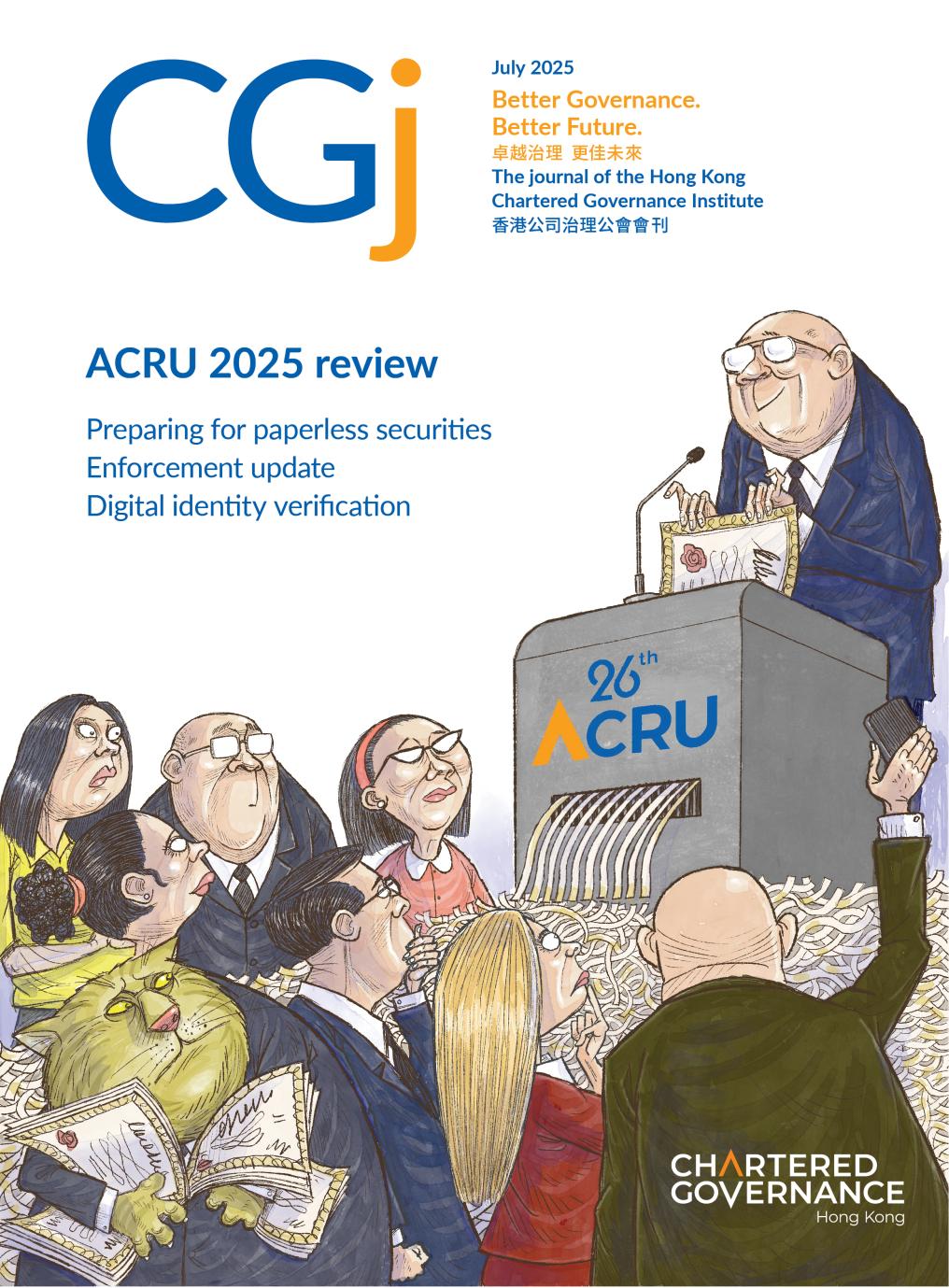In this month’s GoldenGen Reflections series, CGj interviews Dr Eva Chan FCG HKFCG(PE), Head of Investor Relations, C C Land Holdings Ltd.
When did you first join the Institute and what was your professional role at that time?
‘I joined a recently privatised listed company in 1983 as a company secretarial assistant. It was a difficult time economically, with limited job opportunities, and I entered the profession somewhat by chance. This marked the beginning of my exposure to company registration and compliance work. I subsequently enrolled in the company secretary professional diploma course at City Polytechnic of Hong Kong (now City University of Hong Kong), while simultaneously studying for the professional qualification examinations of The Institute of Chartered Secretaries and Administrators of London (now The Chartered Governance Institute (CGI)). I became a graduate of the Institute in 1989 and an Associate in 1990. I was elected as a Fellow in 2006.’
How did training as a company secretary help you move into finance and investor relations?
‘My training as a company secretary instilled in me a habit of meticulous attention to detail. At the beginning of my career, we still used typewriters and any error meant retyping the entire document. I once mistakenly typed 1983 instead of 1984, and my supervisor signed and sent out the document without noticing. I’ve never forgotten that lesson. Since then, I’ve always double or triple checked everything before submission. This discipline has remained with me throughout my career in both finance and investor relations (IR).
The role also requires strong command of language, legal knowledge and understanding of corporate operations. Familiarity with the Companies Ordinance and the Listing Rules meant that I understood company formation, routine filings, board changes, share transfers and even liquidation procedures. My company secretarial background gave me the ability to read regulatory announcements and interpret the Listing Rules, while my accountancy training enabled me to analyse financial data, skills that are invaluable in my current IR role.’
Did membership of the Institute support your career development and, if so, in what ways?
‘Yes. I officially transitioned into investor relations in 2007, which was a golden era for Hong Kong’s IPO market, when it led the world in new listings for several consecutive years. Every listing required not only a CFO and a company secretary, but also a strong IR function to engage with the capital markets and institutional investors.
The role of IR is to introduce the company to potential investors, particularly in the early post-IPO stages. A seasoned IR professional can make a significant difference. I was fortunate to make my career switch during this boom and my foundation as a qualified company secretary played a crucial part. It also paved the way for obtaining my accountancy qualification after working as a company secretarial professional in a number of listed companies. In day-to-day practice, my company secretarial experience has definitely been an advantage.’
What would you say are some of the most significant milestones in the Institute’s history?
‘Key milestones include the establishment of our Institute as an independent body, not just as the Hong Kong Division of CGI. In 2005, we were repositioned as CGI’s Hong Kong/China Division, which laid the groundwork for expansion into the Chinese mainland, and about a decade ago we became the second-largest division outside the UK. Edith Shih’s appointment as the first President of CGI to come from the Hong Kong branch symbolised our emergence onto the international stage. Another major development was the Institute’s name change to The Hong Kong Chartered Governance Institute, from The Hong Kong Institute of Chartered Secretaries. This was not merely a rebranding exercise – it reflected the profession’s evolution beyond company secretarial work to encompass governance, compliance and risk management. It brought our professional identity in line with market needs and elevated the standing of the entire industry.’
Can you share some of your personal golden reflections of your time with the Institute?
‘I am particularly grateful to Neil McNamara, who invited me to join the Membership Committee, soon after I became a Fellow. That marked the beginning of my involvement in Institute affairs. Over time, I took on various committee roles, eventually becoming a Council member, Chair of the Membership Committee and then the Education Committee (now the Qualifications Committee), and later Vice-President.
One of the most challenging experiences for me was while I was serving as Chair of the Education Committee during a major transition of our professional qualification system, despite not having previously served as a committee member. During that time, I worked closely with CGI to reform the curriculum and assessment structure. That experience deepened my understanding of the Institute’s mission and professional standards, and was a period of significant learning and personal growth.’
What advice would you give to the younger generation starting out in their governance careers?
‘Young professionals must have a clear goal and a structured plan to achieve it. If your ambition is to rise to a senior role in a listed company or professional firm, scrutinise job adverts to understand the required experience and competencies, then assess your own strengths and gaps. Early in my career, I would reflect on the key projects I’d worked on each year and match those against target roles, planning my next steps accordingly. Career development should not rely on chance, instead it must be intentional and well organised. It’s equally important to understand what you don’t enjoy. When you love what you do, you’re less afraid of challenges. If your job becomes a daily struggle, it probably means you’re on the wrong path. Passion is what sustains you through the hard work.’
“career development should not rely on chance, instead it must be intentional and well organised”
Dr Eva Chan FCG HKFCG(PE)
Head of Investor Relations, C C Land Holdings Ltd
本期的睿思智享系列,CGj 访问了中渝置地控股有限公司投资者关系主管陈绮华博士 FCG HKFCG(PE)。
您是什么时候加入公会的?当时您的专业身份是什么?
‘我于1983年加入一家刚刚私有化的上市公司,担任公司秘书助理。当时经济环境困难,就业机会有限,我是机缘巧合地进入了这个行业,这也成为我接触公司注册和合规工作的起点。之后,我在香港城市理工学院(现称香港城市大学)修读公司秘书专业文凭课程,同时报考了伦敦特许秘书及行政人员公会(现称特许治理公会)的专业资格考试。我于1989 年成为公会毕业生,并于1990 年成为会士,2006 年获选为资深会士。’
公司秘书的培训如何帮助您转型进入财务和投资者关系领域?
‘公司秘书的培训让我养成了注重细节的习惯。我的职业生涯初期还在使用打字机,一旦出错就得重打整份文件。有一次我误将年份打成 1983 年而非1984 年,主管也没有察觉就签字发出了这份文件。这件事让我至今难忘。从那以后, 我每份文件都要反复检查两三遍才会提交。这个习惯一直维持在我财务和投资者关系领域的整个职业生涯。
这个职位还要求有良好的语言能力、法律知识和对公司运作的理解。由于对《公司条例》和《上市规则》的熟悉,所以我了解公司设立、日常申报、董事会变更、股份转让,甚至清盘程序。公司秘书的背景让我能够阅读监管公告并解读《上市规则》,而我的会计培训则帮助我分析财务数据,这些技能对我目前从事的投资者关系工作也非常有用。’
公会的会员资格是否有助于您的职业发展?如果有,在哪些方面?
‘有的。我在 2007 年正式转入投资者关系行业,当年是香港 IPO 市场的黄金时期,新公司上市数目连续多年领先全 球。每一宗上市项目不仅需要首席财务官和公司秘书,还需要一支强大的投资者关系团队,可以与资本市场和机构投资者沟通。
投资者关系人员的作用是向潜在投资者介绍公司业务,尤其是在公司上市初期。一个经验丰富的投资者关系专业人员能发挥巨大作用。我有幸在这个行业蓬勃发展的时候转型进来,而我作为合资格公司秘书所打下的基础功不可没。在多间上市公司担任公司秘书专业人员的经验也为我考取会计师资格铺平了道路,而在日常工作中,公司秘书的经验也绝对是一个优势。’
您认为公会历史上有哪些重要的里程碑?
‘本会的重要里程碑之一是从特许治理公会香港分会发展为一个独立的专业机构。2005 年,我们重新定位为特许治理公会的香港/中国分会,为日后拓展内地市场奠定了基础。大约十年前,我们成为特许治理公会在英国以外的第二大分会。施熙德女士成为特许治理公会首位来自香港分会的会长,象征着我们走上国际舞台。另一项重大发展是我们将名称由香港特许秘书公会更改为香港公司治理公会,这不仅是一次品牌重塑,更反映了这个专业已从公司秘书工作演变为涵盖治理、合规和风险管理的更广泛范畴。这个转变让我们的专业定位更贴近市场需求,也提升了整个行业的地位。’
您能分享一些关于公会的美好回忆吗?
‘我一直很感激 Neil McNamara 先生,他在我成为资深会士不久以后就邀请我加入会籍委员会。这是我参与公会工作的起点。之后我陆续担任不同委员会的职务,并最终成为理事会成员、会籍委员会主席、教育委员会(现称专业资 格委员会) 主席,之后担任副会长。
对我来说最具挑战性的经历之一,是担任教育委员会主席期间,公会的专业资格制度正值重大转型。当时我从未担任过该委员会的委员,便被任命为主席,在那期间,我需要与特许治理公会密切合作去改革课程及评核架构。这段经历加深了我对公会使命和专业标准的理解,也是我个人成长和学习非常深刻的一段时期。’
您对刚刚开始治理生涯的年轻一代有什么建议?
‘年轻的专业人士必须有明确目标,并制定达成目标的计划。如果你希望将来能在上市公司或专业机构担任高级职位,就要仔细研究职位招聘广告,了解所需的经验和能力, 再对照自己有哪些优势和不足。在我职业生涯的早期, 我会回顾每年参与的重点项目,并将其与目标职位的要求进行比对,以规划下一步。职业发展不应靠运气,而要有计划、 有策略地推进。
同时,了解自己不喜欢什么也很重要。只有热爱工作,才不怕挑战。如果每天上班都很痛苦,那很可能说明你走错了方向。热情是支撑你坚持努力的动力。’
“职业发展不应靠运气,而要有计划、有策略地推进”
陈绮华博士 FCG HKFCG(PE)
中渝置地控股有限公司投资者关系主管



